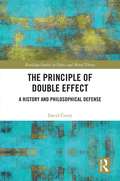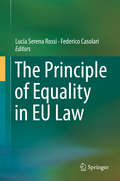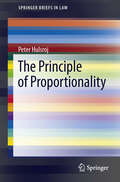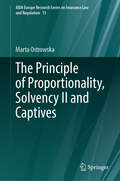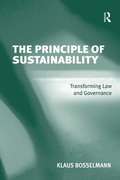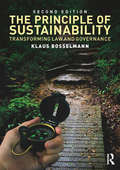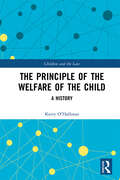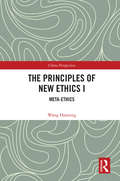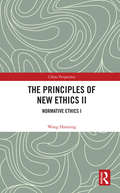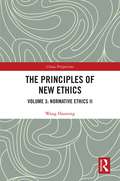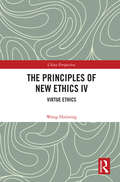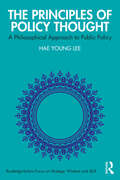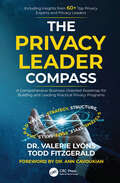- Table View
- List View
The Principle of Double Effect: A History and Philosophical Defense (Routledge Studies in Ethics and Moral Theory)
by David ČernýThis book offers a comprehensive history of the principle of double effect and its applications in ethics. Written from a non-theological perspective, it makes the case for the centrality of the double effect reasoning in philosophical ethics. The book is divided into two parts. The first part thoroughly examines the history of double effect reasoning. The author’s history spans from Thomas Aquinas’s opera omnia to the modern and influential understanding of the principle known as proportionalism. The second part of the book elucidates the principle and addresses various objections that have been raised against it, including those that arise from an in-depth discussion of the trolley problem. Finally, the author examines the role of intentions in ethical thinking and constructs a novel defense of the principle based on fine distinctions between intentions. The Principle of Double Effect: A History and Philosophical Defense will be of interest to scholars and advanced students working in moral philosophy, the history of ethics, bioethics, medical ethics, and the Catholic moral tradition.
The Principle of Effective Legal Protection in Administrative Law: A European Perspective
by Zoltán Szente Konrad LachmayerThis collection presents a comparative analysis of the principle of effective legal protection in administrative law in Europe. It examines how European states consider and enforce the related requirements in their domestic administrative law. The book is divided into three parts: the first comprises a theoretical introductory chapter along with perspectives from International and European Law; part two presents 15 individual country reports on the principle of effective legal protection in mostly EU member states. The core function of the reports is to provide an analysis of the domestic instruments and procedures. Adopting a contextual approach, they consider the historical, political and legal circumstances as well as analysing the relevant case law of the domestic courts; the third part provides a comparative analysis of the country reports. The final chapter assesses the influence and relevance of EU law and the ECHR. The book thus identifies the most important trends and makes a valuable contribution to the debate around convergence and divergence in European national administrative systems.
The Principle of Equality in EU Law
by Lucia Serena Rossi Federico CasolariThis book provides a comprehensive and updated legal analysis of the equality principle in EU law. To this end, it argues for a broad definition of the principle, which includes not only its inter-individual dimension, but also the equality of the Member States before the EU Treaties. The book presents a collection of high-quality academic and expert contributions, which, in light of the most recent developments in implementing the post-Lisbon legal framework, reflect the current interpretation of the equality principle, examining its performance in practice with a view to suggesting possible solutions in order to overcome recurring problems. To this end the volume is divided into three Parts, the first of which addresses a peculiar aspect of the EU equality that is mostly overlooked in the investigations devoted to this topic, namely, equality among States. Part II shifts to the inter-individual dimension of equality and explores some major developments contributing to (re)shaping the global framework of EU anti-discrimination law, while Part III undertakes a more practical investigation devoted to the substantive strands of that area of EU law.
The Principle of Proportionality
by Peter HulsrojThe book applies the principle of proportionality to a number of conventional wisdoms in the social sciences, such as in dubio pro reo and the assumption that a crime is always a crime; that you must go to war if instructed to do so. Individuals and states are not obliged to come to the aid of stricken individuals and states. The book is organised in seven chapters, each dealing with a self-standing theme related to proportionality.
The Principle of Proportionality, Solvency II and Captives (AIDA Europe Research Series on Insurance Law and Regulation #13)
by Marta OstrowskaThis book offers an in-depth analysis of the principle of proportionality in the EU insurance regulatory regime. It takes a critical look at how proportionality has been implemented in Solvency II and tests its effectiveness on captive (re)insurance undertakings. Given their unique business model, captives are considered the primary beneficiary of proportionality and therefore offer the perfect ‘litmus test’ for the principle’s effectiveness. In a world characterized by overregulation and increasingly complex financial markets, governments and policymakers face the challenge of regulating markets without hindering their growth. As ‘one-size-fits-all’ approaches have long-since been recognized as detrimental, the EU is seeking to develop a regulatory technique which allows more individual regulatory treatment while ensuring a level playing field. The first revolutionary step towards this goal was taken in Solvency II (Directive 2009/138/EC), which introduced a principle of proportionality to the EU insurance market. The principle is a unique tool which makes it possible to adjust the requirements of the Solvency II framework to the nature, scale, and complexity of each individual insurance undertaking’s risk profile. It is intended to help remove an unnecessary regulatory burden for insurance undertakings, and to prevent the proliferation of regulations in general. However, the practical implementation of proportionality is not without its share of obstacles. The principle’s generic nature and the lack of guidance have caused a great deal of confusion regarding its practical application and prevented insurance undertakings from using its benefits to the fullest. Consequently, the principle of proportionality has been subject to revision within the first Solvency II review process. The book will benefit captive owners, captive managers, regulators, supervisors, practitioners, academics, students and, more generally, all those involved with or interested in the insurance market.
The Principle of Solidarity: International and EU Law Perspectives (Global Europe: Legal and Policy Issues of the EU’s External Action #2)
by Eva Kassoti Narin IdrizThis edited volume explores the principle of solidarity in international and EU law. Although the concept is regularly invoked in international and EU legal and policy debates alike, its meaning, nature and functions, as well as normative contours still remain nebulous.The contributions in this volume reflect on the legal trajectory of solidarity in international and EU law and offer unique insights into the evolution and status of the principle in different fields of international and EU law. By doing so, the book also serves as a springboard for answering broader questions pertaining to what the stage of development of this principle may imply for the two legal orders and their interaction. As the chapters of this book show, the debate on solidarity is premised on conflicting visions regarding the values underpinning the international legal order as well as the self-interest or community-oriented driving forces behind States’ action at the international level. The regional (EU law) perspective offers a new lens through which to revisit classic questions pertaining to the nature of modern international law and to assess its continuing relevance in a world of regional organizations presenting different visions (and levels) of co-operation. This book, the second volume to appear in the Global Europe Series, will appeal to international and EU law researchers and policy-makers alike with an interest in the nature and function of the principle of solidarity in international and EU law. Eva Kassoti is Senior researcher in EU and International Law at the T.M.C. Asser Institute in The Hague, The Netherlands and the Academic Co-ordinator of CLEER. Narin Idriz is Researcher in EU Law at the T.M.C. Asser Institute in The Hague, The Netherlands.
The Principle of Sustainability: Transforming Law and Governance
by Klaus BosselmannThis book investigates how sustainability informs the universal principles used in domestic and international law. It calls for the acceptance of sustainability as a recognized legal principle which could be applied to the entire legal system rather than just environmental law and regardless of its international or domestic levels. To this end, the book makes a contribution to a theory of global law by discussing whether, as a universally shared concern, environmental protection and the principle of sustainability should contribute to the 'greening' of the fundamental principles of law and governance. The book will be a valuable resource for students, researchers and policy makers working in the areas of environmental law and governance.
The Principle of Sustainability: Transforming law and governance
by Klaus BosselmannThis book investigates how sustainability informs key principles and concepts of domestic and international law. It calls for the recognition of ecological sustainability as a fundamental principle to guide the entire legal system rather than just environmental legislation. To this end, the book makes a contribution to global environmental constitutionalism, a rapidly growing area within comparative and international environmental law and constitutional law. This 2nd edition has been fully revised and updated to take account of recent developments and new case law. The book will be a valuable resource for students, researchers and policy makers working in the areas of environmental law and governance.
The Principle of ne bis in idem in International Criminal Law: Balancing the Interests of Individuals, States, and the International Community
by Gaiane NuridzhanianThe legal principle of ne bis in idem proclaims that no person shall be tried twice for the same matter. This principle is important in theory and practice, as it safeguards a fundamental individual interest and spares the accused the burden of a repeat trial. This book provides a comprehensive examination of the ne bis in idem principle in international criminal law. Readers will find a detailed account of ne bis in idem rules in the law and practice of the International Criminal Court and other international criminal courts. The book also examines international law ne bis in idem rules that govern the domestic prosecution of international crimes. The book will be a valuable resource for researchers, academics and policy-makers working in the areas of International Criminal Law and International Human Rights law. It will be of particular use to those interested in defense rights, admissibility of cases before international criminal courts, and issues arising from prosecution of international crimes in multiple criminal jurisdictions.
The Principle of the Welfare of the Child: A History (Children and the Law)
by Kerry O'HalloranThis book traces the evolution of the welfare interests of the child principle over the centuries in England & Wales to provide a record of the key milestones in its development. It does so by comparing and contrasting the part it has played in the public – care, protection and control – and in the private – matrimonial, adoption etc – sectors of family law. By analysing the content of the principle this book discloses the essence of what has been termed ‘the golden thread running through the common law’. By considering the ways in which the legal system has shaped and been shaped by the principle, it reveals its structural influence. By identifying and assessing the significance of its operational role and functions, it shows how this principle has changed the law relating to children. In addition to a digest of cases and legislation that tracks the evolution of this legal principle, academics and other researchers will find a wealth of information on how that evolution reflects the corresponding changes in social mores. For those interested in the ethics and morality, there is much illuminating evidence on how the law has balanced this principle relative to others within both civil and criminal contexts.
The Principles and Practice of International Aviation Law
by Brian F. Havel Gabriel S. SanchezThe Principles and Practice of International Aviation Law provides an introduction to, and demystification of, the private and public dimensions of international aviation law. Unlike other global sectors, the air transport industry is not governed by a discrete area of the law, but by disparate transnational regulatory instruments. Everything from the routes that an international air carrier can serve to the acquisition of its fleet and its liability to passengers and shippers for incidents arising from its operations can be the object of bilateral and multilateral treaties that represent diverse and often contradictory interests. Beneath this are hundreds of domestic regulatory regimes that also apply national and international rules in disparate ways. The result is an agglomeration of legal cultures that can leave even experienced lawyers and academics perplexed. By combining classical doctrinal analysis with insights from newer disciplines such as international relations and economics, the book maps international aviation law's complex terrain for new and veteran observers alike.
The Principles and Practice of International Commercial Arbitration
by Margaret L. MosesThis book provides the reader with immediate access to understanding the world of international arbitration. Arbitration has become the dispute resolution method of choice in international transactions. This book explains how and why arbitration works. It provides the legal and regulatory framework for international arbitration, as well as practical strategies to follow and pitfalls to avoid. It is short and readable, but comprehensive in its coverage of the basic requirements, including the most recent changes in arbitration laws, rules and guidelines. The second edition includes updates on rules and guidelines, such as the arbitration rules of the ICC, the SCC, the ACICA and UNCITRAL, as well as the 2010 IBA Rules on Taking of Evidence in International Arbitration. The author includes insights from numerous international arbitrators and counsel, who tell firsthand about their own experiences of arbitration and their views of best practices.
The Principles and Practice of International Commercial Arbitration: Third Edition
by Moses Margaret L.The Principles and Practice of International Commercial Arbitration provides the reader with immediate access to understanding the world of international arbitration. Arbitration has become the dispute resolution method of choice in international transactions. This book explains how and why arbitration works. It provides the legal and regulatory framework for international arbitration, as well as practical strategies to follow and pitfalls to avoid. It is short and readable, but comprehensive in its coverage of the basic requirements, including the most recent changes in arbitration laws, rules, and guidelines. The second edition includes updates on rules and guidelines, such as the arbitration rules of the ICC, the SCC, the ACICA, and UNCITRAL, as well as the 2010 IBA Rules on Taking of Evidence in International Arbitration. In the book, the author includes insights from numerous international arbitrators and counsel, who tell firsthand about their own experiences of arbitration and their views of best practices. Throughout the book, the principles of arbitration are supported and explained by the practice, providing a concrete approach to an important means of resolving disputes.
The Principles of BRICS Contract Law: A Comparative Study of General Principles Governing International Commercial Contracts in the BRICS Countries (Ius Gentium: Comparative Perspectives on Law and Justice #102)
by Mauro Bussani Salvatore MancusoThis book examines national reports on contract law in each of the BRICS countries (Brazil, Russia, India, China and South Africa) in order to provide a comparative analysis. It then establishes common principles, where possible, as well as a set of general “soft law” principles governing international commercial contracts in these countries. The importance of commercial transactions in the BRICS countries is rapidly growing, yet differences in contract law among these countries can lead to misunderstandings and disputes. The rapid development of the BRICS instruments (and the legal implications of their use) suggests the need to address common legal issues that could harm the continued development of the BRICS economies. Contract law represents one of the core areas in which this process can take place. Addressing the salient legal issues within the BRICS discourse requires a comprehensive, comparative approach that explores the different solutions provided by each member country, in order to identify similarities and convergences. This process may ultimately help to reduce the legal obstacles to, and indirect costs of, cross-border transactions by offering a transparent and predictable legal environment for any future attempt at adopting common legal instruments.
The Principles of New Ethics I: Meta-ethics (China Perspectives)
by Wang HaimingFrom Descartes to Spinoza, Western philosophers have attempted to propose an axiomatic systemization of ethics. However, without consensus on the contents and objects of ethics, the system remains incomplete. This fourvolume set presents a model that highlights a Chinese philosopher’s insights on ethics after a 22-year study. Three essential components of ethics are examined: metaethics, normative ethics, and virtue ethics. This volume mainly studies meta- ethics. The author not only studies the fi ve primitive concepts of ethics— “value,” “good,” “ought,” “right,” and “fact”— and reveals their relationship, but also demonstrates the solution to the classic “Hume’s guillotine”— whether “ought” can be derived from “fact.” His aim is to identify the methods of making excellent moral norms, leading to solutions on how to prove ethical axioms and ethical postulates. Written by a renowned philosopher, the Chinese version of this set sold more than 60,000 copies and has exerted tremendous infl uence on the academic scene in China. The English version will be an essential read for students and scholars of ethics and philosophy in general.
The Principles of New Ethics II: Normative Ethics I (China Perspectives)
by Wang HaimingFrom Descartes to Spinoza, Western philosophers have attempted to propose an axiomatic systemization of ethics. However, without consensus on the contents and objects of ethics, the system remains incomplete. This four-volume set presents a model that highlights a Chinese philosopher’s insights on ethics after a 22-year study. Three essential components of ethics are examined: metaethics, normative ethics, and virtue ethics. In this volume, the author sets out to discuss morality, and shows how the reasoning behind it can be both good and bad for human society from various perspectives. A system of an ultimate standard of morality is introduced and it is shown that where there are conflicts between different moral norms that cannot be compromised, people undoubtedly sacrifice less important moral norms to follow more fundamental and important moral norms or principles.The Chinese version of this set sold more than 60,000 copies and has exerted tremendous influence on the academic scene in the People’s Republic. The English version will be an essential read for students and scholars of ethics and philosophy in general.
The Principles of New Ethics III: Normative Ethics II (China Perspectives)
by Wang HaimingFrom Descartes to Spinoza, Western philosophers have attempted to propose an axiomatic systemization of ethics. However, without consensus on the contents and objects of ethics, the system remains incomplete. This four-volume set presents a model that highlights a Chinese philosopher’s insights on ethics after a 22 year study. Three essential components of ethics are examined: metaethics, normative ethics, and virtue ethics. This volume is the second part of the discussion on normative ethics. The author analyzes humanity, liberty, justice, happiness, and systems of moral rules. He puts forward 26 value standards that construct a system of measuring state instruction; reveals the relationship between humanity, liberty and justice; puts forward three objective laws of happiness; and discusses the goodness of important moral rules, such as honesty, self-respect and courage. This set is an essential read for students and scholars of ethics and philosophy in general.
The Principles of New Ethics IV: Virtue Ethics (China Perspectives)
by Wang HaimingFrom Descartes to Spinoza, Western philosophers have attempted to propose an axiomatic systemization of ethics. However, without consensus on the contents and objects of ethics, the system remains incomplete. This four-volume set presents a model that highlights a Chinese philosopher’s insights on ethics after a 22-year study. Three essential components of ethics are examined: metaethics, normative ethics, and virtue ethics. In this volume, the author analyzes the relationship between people’s sense of reputation, the political and economic status of a nation, and the observation of virtue ethics and he argues that reputation can encourage people to conform to virtue ethics. In addition, a nation’s political and economic status is closely connected to people’s virtue ethics. That is, people will have higher virtue ethics when constitutional democracy, a market economy without government control, freedom of speech, and the moral system of liberalism and egalitarianism are established in a nation. This title is an essential read for students and scholars of ethics and philosophy in general.
The Principles of Policy Thought: A Philosophical Approach to Public Policy (Routledge-Solaris Focus on Strategy, Wisdom and Skill)
by Hae Young LeePolicy thought integrates the “why” of political philosophy and the “how” of public policy formulation. Lee outlines five key principles for the development of policy thought:• The Principle of Policy Statism• The Principle of Policy Goodness• The Principle of Policy Balance• The Principle of Policy Practicality• The Principle of Policy Humans: Interpenetrated Policy Humans with Non-humans Each principle is derived from a combination of Confucian and other East Asian philosophies, as well as contemporary Western political philosophy. In combination they offer an innovative approach to formulating, configuring and assessing public policy, with ethics and efficacy. An essential guide to incorporating big picture philosophical questions into pragmatic policy for students, practitioners and scholars of public policy and administration.
The Priority of Love: Christian Charity and Social Justice (New Forum Books #57)
by Timothy P. JacksonThis book explores the relation between agape (or Christian charity) and social justice. Timothy Jackson defines agape as the central virtue in Christian ethical thought and action and applies his insights to three concrete issues: political violence, forgiveness, and abortion. Taking his primary cue from the New Testament while drawing extensively from contemporary theology and philosophy, Jackson identifies three features of Christian charity: unconditional commitment to the good of others, equal regard for others' well-being, and passionate service open to self-sacrifice for the sake of others.Charity, prescribed by Jesus for his disciples and named by Saint Paul as the "greatest" theological virtue, is contrasted with various accounts of justice. Jackson argues that agape is not trumped by justice or other goods. Rather, agape precedes justice: without the work of love, society would not produce persons capable of merit, demerit, and contract, the elements of most modern conceptions of justice. Jackson then considers the implications of his ideas for several questions: the nature of God, the relation between Christian love and political violence, the place of forgiveness, and the morality of abortion. Arguing that agapic love is to be construed as a gift of grace as well as a divine commandment, Jackson concludes that love is the "eternal life" that makes temporal existence possible and thus the "first" Christian virtue. Though foremost a contribution to Christian ethics, Jackson's arguments and the issues he takes up will find a broader readership.
The Prison Guard's Daughter: My Journey Through the Ashes of Attica
by Deanne Quinn MillerIn this moving memoir, a woman recounts her search for truth and justice regarding her father’s murder during America’s deadliest prison riot.Deanne Quinn Miller was five years old when her father—William “Billy” Quinn—was murdered in the first minutes of the Attica Prison Riot, the only corrections officer to die at the hands of inmates. But how did he die? Who were the killers? Those questions haunted Dee and wreaked havoc on her psyche for thirty years. Finally, when she joined the Forgotten Victims of Attica, she began to find answers. This began the process of bringing closure not only for herself but for the other victims’ families, the former prisoners she met, and all of those who perished on September 13, 1971—the day of the “retaking,” when New York State troopers and corrections officers at the Attica Correctional facility slaughtered twenty-nine rioting prisoners and ten hostages in a hail of gunfire.In The Prison Guard’s Daughter, Dee brings readers in on her lifelong mission for the truth and justice for the Attica survivors and the families of the men who lost their lives. But the real win was the journey that crossed racial and criminal-justice divides: befriending infamous Attica prisoner Frank “Big Black” Smith, meeting Richard Clark and other inmates who tried to carry her father to safety after his beating, and learning what life was like for all the people—prisoners and prison employees alike—inside Attica. As Miller lays bare the truth about her father’s death, the world inside Attica, and the state’s reckless raid and coverup, she conveys a narrative of compassionate humanity and a call for prison reform.Praise for The Prison Guard’s Daughter“A remarkable tale of healing and reconciliation, born from the tragedy of the nation’s deadliest prison uprising . . . . The Prison Guard’s Daughter reminds us that we can reach across divides—racial, social, economic—and learn lessons about others that inevitably teach us about ourselves. In a world in which the chasms among people seem to swell wider every day, this book tells us that our true angels can prevail, as long as we are ready to engage them.” —Sister Helen Prejean, author of Dead Man Walking: The Eyewitness Account of the Death Penalty That Sparked a National Debate“In the wake of the unimaginable trauma caused by the State of New York, there were the courageous few who had to endure even more pain to make sure that there was some reckoning with this horrific event, and some measure of justice for its victims. This is the extraordinarily beautiful story of one of the most courageous of those few, Dee Quinn Miller, who, quite literally, changed history.” —Heather Ann Thompson, Pulitzer Prize–winning author of Blood in the Water: The Attica Prison Uprising of 1971 and its Legacy“A personal, affecting, and eye-opening account of a pivotal tragedy on the seemingly endless road to prison reform.” —Booklist
The Privacy Fix: How to Preserve Privacy in the Onslaught of Surveillance
by Richard Warner Robert H. SloanOnline surveillance of our behavior by private companies is on the increase, particularly through the Internet of Things and the increasing use of algorithmic decision-making. This troubling trend undermines privacy and increasingly threatens our ability to control how information about us is shared and used. Written by a computer scientist and a legal scholar, The Privacy Fix proposes a set of evidence-based, practical solutions that will help solve this problem. Requiring no technical or legal expertise, the book explains complicated concepts in clear, straightforward language. Bridging the gap between computer scientists, economists, lawyers, and public policy makers, this book provides theoretically and practically sound public policy guidance about how to preserve privacy in the onslaught of surveillance. It emphasizes the need to make tradeoffs among the complex concerns that arise, and it outlines a practical norm-creation process to do so.
The Privacy Leader Compass: A Comprehensive Business-Oriented Roadmap for Building and Leading Practical Privacy Programs
by Todd Fitzgerald Valerie LyonsCongratulations! Perhaps you have been appointed as the Chief Privacy Officer (CPO) or the Data Protection Officer (DPO) for your company. Or maybe you are an experienced CPO/DPO, and you wonder – "what can I learn from other successful privacy experts to be even more effective?" Or perhaps you are considering a move from a different career path and deciding if this is the right direction for you. Seasoned award-winning Privacy and Cybersecurity leaders Dr. Valerie Lyons (Dublin, Ireland) and Todd Fitzgerald (Chicago, IL USA) have teamed up with over 60 award-winning CPOs, DPOs, highly respected privacy/data protection leaders, data protection authorities, and privacy standard setters who have fought the tough battle. Just as the #1 best-selling and CANON Cybersecurity Hall of Fame winning CISO Compass: Navigating Cybersecurity Leadership Challenges with Insights from Pioneers book provided actionable advice to Chief Information Security Officers, The Privacy Leader Compass is about straight talk – delivering a comprehensive privacy roadmap applied to, and organized by, a time-tested organizational effectiveness model (the McKinsey 7-S Framework) with practical, insightful stories and lessons learned. You own your continued success as a privacy leader. If you want a roadmap to build, lead, and sustain a program respected and supported by your board, management, organization, and peers, this book is for you.
